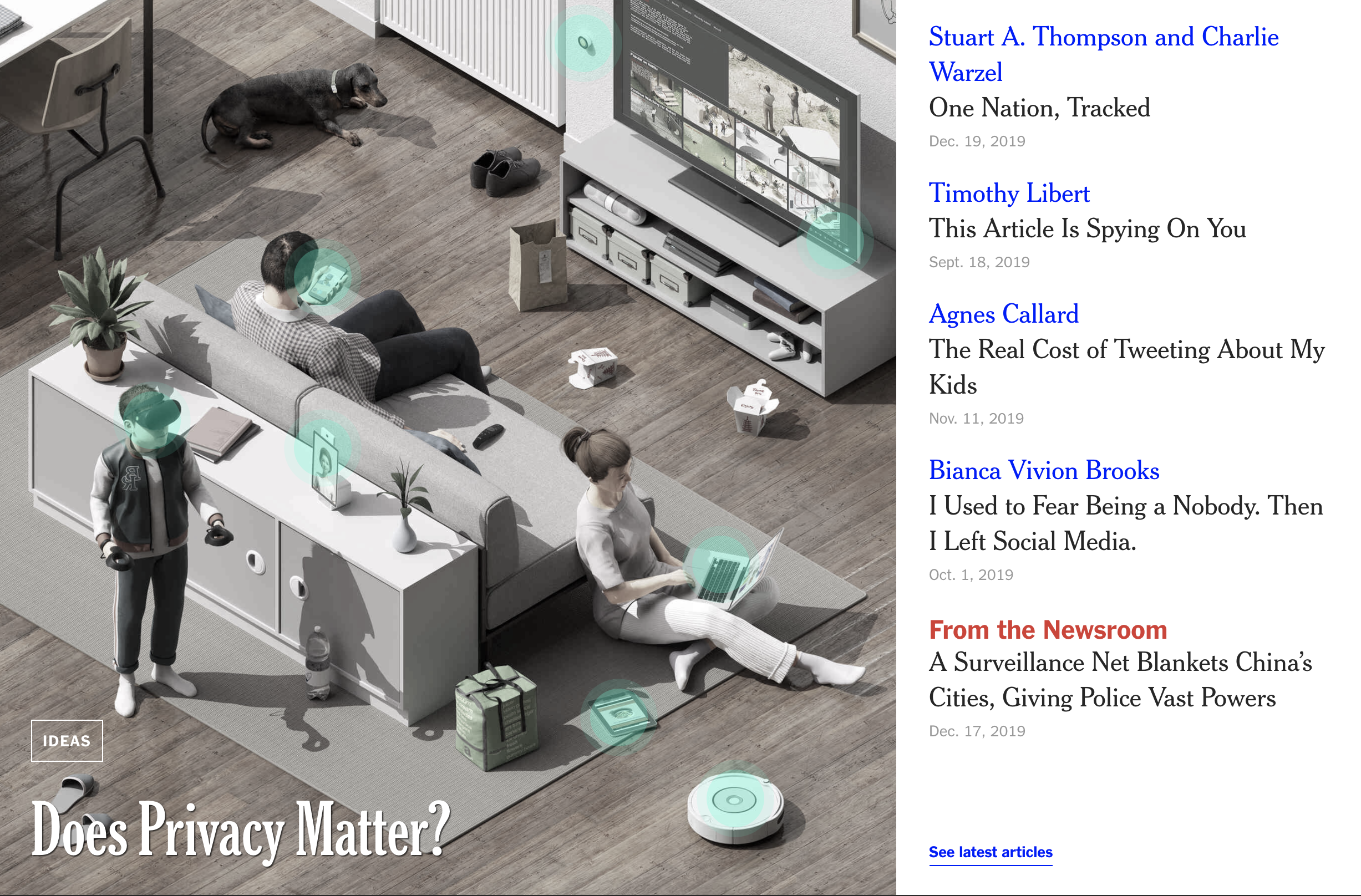 Back to Case Studies
Back to Case Studies
Location
New York City, NY
In just over a decade, digital technologies of great power and capability have woven themselves into the fabric of work, recreation, and domestic life. While this development has clearly had its benefits, the proliferation of microphones, cameras, and behavior-influencing algorithms has dramatically impacted our traditional conceptions of privacy, disorienting our traditional bearings of what it means to be private.
Ninety percent of all data has been created in the past two years.
With the Cambridge Analytica Scandal in 2018, these questions became even more pressing, and privacy entered public discourse with a renewed force and vigor. At this decisive moment of legislative possibility and social interest, the Privacy Project by the New York Times has done an exceptional job bringing together a diverse set of stakeholders to explore questions surrounding privacy in a clear, engaging, and novel fashion.
 Since its launch in April 2019, The Privacy Project has published over 160 articles, interactives and videos and garnered tens of millions of page views.
Since its launch in April 2019, The Privacy Project has published over 160 articles, interactives and videos and garnered tens of millions of page views.
The capabilities and uses of digital technologies is progressing at such a rate that general understanding of how these systems broadly operate, let alone the complexities of data collection and processing, is severely lacking. Despite the publicity surrounding the Cambridge Analytica Scandal of 2018, a survey conducted by Pew Research in 2019 found that seventy-four percent of Facebook users did not know that the platform classified their interests and traits, and presumably an even larger percent of users do not understand why this classification occurs.
This situation is not helped by the fact that theorizing on data privacy has taken place behind the tall walls of the university while reporting on data privacy has largely been confined to descriptive reporting and shallow analysis. While individual actors such as Facebook and Twitter have been prominently criticized for their privacy transgressions, little accessible work has been done to describe the broader institutional ecosystems that have so profoundly shaped modern privacy, whether that be data brokers, consumer electronic firms, or data scientists.
 From the banalities of everyday life to the soaring heights of global politics, the Privacy Project attempts to explore the complexity of the privacy issue in a holistic fashion
From the banalities of everyday life to the soaring heights of global politics, the Privacy Project attempts to explore the complexity of the privacy issue in a holistic fashion
In April 2019, The New York Times launched the Privacy Project, a monthslong project to explore the technology and where it is taking us, and to convene debate about how it can best help realize human potential. Utilizing its influence and resources, the Times has brought together lawmakers like Rep. Kevin McCarthy, academics like Clare Garvie, and activists like Susan Fowler into discussion about critical issues surrounding privacy. In less than a year, the Times has utilized in-depth reporting, video investigations, and interactive articles to cover privacy issues as diverse as China’s surveillance of the Uighur Muslims, the status of data privacy legislation in America, and the potential of new “smart toys” to surveil children.
Since April 2019, the Privacy Project has garnered tens of millions of page views, published over 160 articles, and reached hundreds of thousands of readers through its newsletter. The Privacy Project has received contributions from active legislators, prominent privacy rights activists, and leading technology journalists. Additionally, the Privacy Project was the recipient of the 2019 Online Journalism Award in the category of “Online Commentary.”
As the debate surrounding the adoption of a federal digital privacy standard continues in America, initiatives like the Privacy Project serve the vital role of helping demystify the often technical and obscure minutiae of the digital ecosystem. Digital technologies and the legal frameworks that govern their conduct are of great public interest, and the New York Times will continue to offer a diverse set of insights, explanations, and recommendations from a variety of stakeholders.